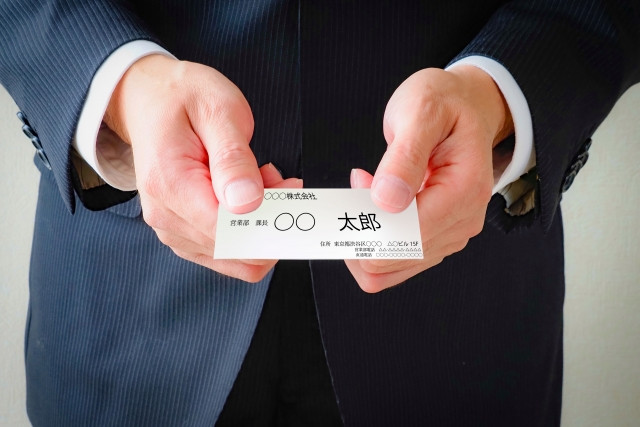In this article, we introduce the correct way to do Meishi Koukan, address the importance of Japanese business card exchange, and more. Knowing the right etiquette and manner for Meishi Koukan is important for anyone working and doing business in Japan as it is the first step to building long-term business partnerships.
First Published: 2020-09-11
Updated: 2024-07-17
Table of Contents
- What is Meishi Koukan (名刺交換)?
- The Importance of Meishi Koukan in Japanese Business Culture
- Japanese Business Card Design, The Essential Information
- How to do Meishi Koukan Correctly
- Find a Job in Japan with WeXpats
 Are you having any issues with job-hunting in Japan?
Are you having any issues with job-hunting in Japan?
What is Meishi Koukan (名刺交換)?

Meishi Koukan (名刺交換) refers to the formal exchange of Japanese business cards in Japanese business culture. It is a fundamental aspect of business etiquette in Japan and plays a significant role in establishing professional relationships. The Kanji for Meishi Koukan can be broken down into:
- 名刺 (Meishi) meaning “business card”
- 交換 (Koukan) meaning “exchange”
When two individuals meet for the first time in a business context or during introductions, they exchange business cards. The exchange is typically accompanied by a bow as a gesture of respect.
Writer's Pick
The Importance of Meishi Koukan in Japanese Business Culture

In this era of advanced technology, we mostly create connections through the internet. Social media and email have made contact and exchange of information incredibly simple and straightforward with immediate contact possible anytime and anywhere.
In Japan, however, traditional business customs such as business card exchange is still practised. If you are a foreign national coming to Japan for important business matters, or if you have just joined a Japanese company, you must keep in mind the importance of how important business cards and business card exchanges are.
The First Step in Business Communications
The purpose of Meishi Koukan is first-time greetings and self-introduction for face-to-face meetings in a business context. For example, if you visit a business partner and are waiting in the reception room, the best timing for Meishi Koukan is when he/she enters the room to welcome you. At that moment, you should have your business card ready to be handed over.
Meishi Koukan is not just a mere act of formality, but also a significant process of making a great first impression for smooth future dealings.
What Makes Business Cards So Important
In Japan, business cards are considered an extension of yourself or the other person. It is not too far-fetched to say that a business card represents you or the other person.
It is no exaggeration to say that how you receive and how you handle a business card received reveals one’s common sense and knowledge as a business person. As such, any business card received should be handled with care and respect, especially throughout a business meeting in which it was received.
In fact, there are rules and etiquette to be followed when exchanging business cards in Japan. Failure to follow these rules and etiquette could give off a bad impression and cost you a deal. You might be forgiven for being a “clueless foreigner”, or make an even worse impression for not respecting the customs and culture of a country you are in.
Japanese Business Card Design, The Essential Information

Japanese business cards are quite standard in design and format. If you are interested in making your own, just search online for design references. For your information, the standard Japanese business card size is 55mm x 91mm.
Japanese business cards usually contain the following essential information:
- Company Name and Logo
- Company Information - company address, contact information, website
- Your Name
- Your Department and Position
- Your Contact Information
Some Japanese business cards may even contain information about opening hours.
Bilingual Japanese Business Card Design
With the increase in international trade and global operations, bilingual business cards have become fairly common in Japan, especially for those working in international fields.
Normally, the back of a Japanese business card may be blank or contain more information about the company apart from the essential information above. For example, details about the company’s services, a map of the company’s office, information about other branches, etc.
However, in the case of bilingual Japanese business cards, it is common for one side to be in Japanese and the other to be in English or some other foreign language. Some businesses may have separate cards for Japanese and foreign language, but for cost-saving purposes, different language on each side is more common.
How to do Meishi Koukan Correctly
Moving on to the most important part of this article, “How to do Japanese Business Card Exchange”.
The Correct Exchange Order for Meishi Koukan
Who starts first during Meishi Koukan? Typically, the visiting party will initiate Meishi Koukan. If there are multiple people involved, then the people with higher status exchange cards with each other first.The order of exchange is from highest position to lowest position.
For example, Company A is visiting Company B. Company A (visiting) consists of Manager and Staff A, Company B consists of Manager and Staff B. The order of exchange will be as follows:
- Company A’s Manager and Company B’s Manager exchange business cards. As the visitor, Company A’s Manager gives first.
- Company A’s Staff A and Company B’s Manager exchange business cards. As the visitor, Company A’s Staff A gives first.
- Company A’s Manager and Company B’s Staff B exchange business cards. As the visitor, Company A’s Manager gives first.
- Company A’s Staff A and Company B’s Staff B exchange business cards. As the visitor, Company A’s Staff A gives first.
It can be confusing, and even Japanese get confused when figuring out who goes first.
Meishi Koukan: Giving Business Card
- Bow as a sign of respect.
- Hold the corners of the business card with two hands
- Be careful not to cover any information on the card, and make sure the card is facing the recipient.
- You may give a brief self-introduction while exchanging business cards. Here’s an example:
“初めまして (Hajimemashite)。
株式会社▲▲▲の▲▲と申します。(“Company Name” no “Your Name” to moushimasu.)
よろしくお願いします。(Yoroshiku onegaishimasu)”
Meishi Koukan: Receiving Business Card
- Bow together with the person presenting a business card.
- Receive the card with two hands.
- Be careful not to cover the company logo or the person’s name.
- Take some time to study the information on the card and admire the design as a sign of appreciation. Confirm the name of the presenter and say thank you. Here’s an example:
“頂戴いたします (Choudaiitashimasu)
▲▲様ですね。(“Name on Card”-sama desune)” - Place the card on the table if there is one, otherwise keep it carefully away in your business card holder. If you receive multiple cards from multiple people, arrange them neatly on the table by seating order or by status order.
Dos of Meishi Koukan
- Have your business cards ready to exchange in advance. Digging around looking for business cards in front of a person is considered rude.
- Bring extra business cards. Not having enough business cards is considered bad manners.
- Maintain eye contact and a smile when exchanging business cards.
- Have a proper business card holder. Not only does it look more professional, it is practical, allowing for easy storage and access.
Don’ts of Meishi Koukan
- Do not immediately keep away a business card you received. Take a moment to appreciate it.
- Do not write anything on a business card received.
- Do not cover the person’s name or company logo with your fingers. This is considered rude.
Find a Job in Japan with WeXpats

WeXpats operates a service for foreign nationals who want to work in Japan. There are jobs in a variety of industries. There are 2 services available on WeXpats - WeXpats Agent for full time jobs and WeXpats Jobs for part time jobs.
Looking for a Full Time Position? Leave it to WeXpats Agent!
WeXpats Agent is a career support service that specialises in employment for foreign nationals living in Japan.
Recruitment agencies in Japan are a service where dedicated career advisors will assist you with your job hunt for free. In addition to introducing open positions, we also provide support to help you create your Japanese resume and practice for interviews. Worried about job hunting in Japanese? We are here for you.
Features of WeXpats Agent
-
We have many job openings that are a good fit for foreign nationals to work in, such as translation, interpretation, inbound, etc. jobs that make use of your language skills, as well as engineering etc. jobs that do not require Japanese skills.
-
Our career advisors support and help you prepare your resume and practice job interviews with you. Clearly communicate your strengths to the hiring company.
-
We will handle communication with companies on your behalf, such as arranging interview dates and negotiating conditions. And thereby reducing your stress and time spent.
Finding a Part Time Job? Browse on WeXpats Jobs!

WeXpats Jobs is a part time job site for foreign nationals living in Japan. You can search for jobs in 11 languages (English, Vietnamese, Korean, Indonesian, Traditional Chinese, Simplified Chinese, Burmese, Thai, Spanish, Portuguese), including Japanese. Find jobs that suit you by specifying your Japanese language level, occupation, location, and etc.
※ You can register from outside Japan, but only those living in Japan can apply for jobs.




































